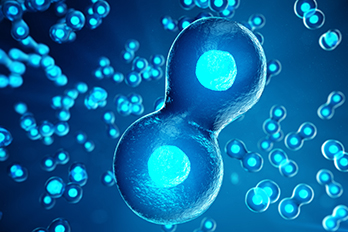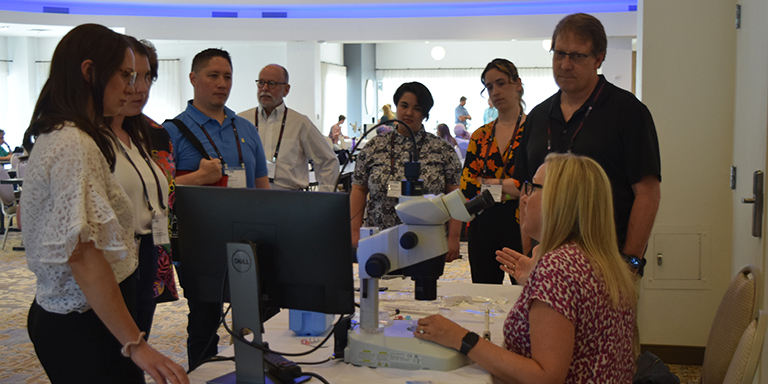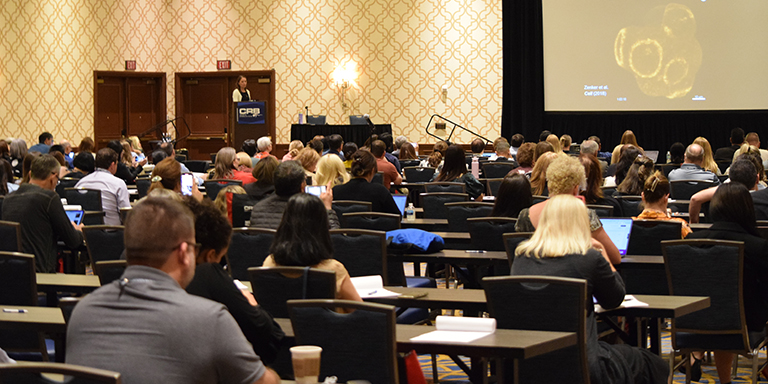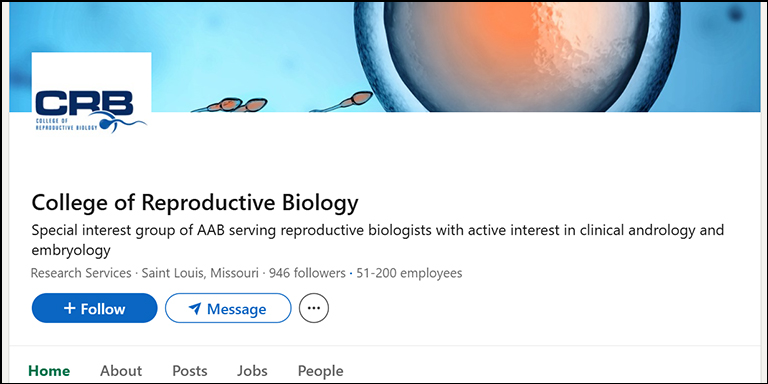
Newsletter
Special Interest Group of the American Association of Bioanalysts (AAB)

Are You Considering Becoming Board Certified? You Have Our Support
Marina Gvakharia, MD, PhD, HCLD(ABB), ELD(ABB)
Dear friends,
I wrote this piece for the CRB newsletter in a pre-COVID-19 era. Our world has changed since then. Studying for one’s boards may seem as a dubious way to distract from this crisis. It is not. We will beat COVID-19 into submission and we will rebuild our lives and our practices. As we manage and support our laboratories and teams through this crisis, we will grow professionally. We will learn a lot about crisis management from this experience. We can also use this time to learn academically. Remember that stack of F&S magazines collecting dust on your nightstand? Never had time to study for your board examination? Now is a good time to channel all that compassion and intellectual energy that you bring to work every day into something that will help you emerge stronger. We, past and current members of the CRB board, strongly encourage you to use this time to study. We stand ready to support you in this process.
Please be safe and healthy. Here goes my pre-war piece.
So. You have taken your final tests in college/graduate school and had your graduation party.
“I am never going to take another test again. Ever,” you said. Sounded awesome at the time, right? But as it turns out, you were wrong.
You see, through some series of some improbable events, you ended up in the wonderful world of reproductive laboratory medicine and you now handle people’s precious gametes and embryos at work. Make living humans for a living. Sound serious? It does. Because it is.
You work hard. You learn a lot. You appreciate terrible seriousness and gravity of your work. You are also really good at what you do. What is your next step for advancing your career? Most of your friends at work – doctors, nurses, surgical techs – are licensed and/or certified to practice their trade. Heck, even your hair stylist and manicurist are licensed. Sounds as it is time you too consider becoming board certified in your profession and add some well-deserved recognition and gravitas to your efforts and some impressive initials to your name.
Once you are ready and eager to take on the challenge, the AAB Board of Registry (ABOR) and American Board of Bioanalysis (ABB) have multiple certification options for you to choose from.
If you are a bench embryologist/andrologist, ABOR offers two certifications: Embryology Laboratory Scientist (ELS) and Andrology Laboratory Scientist (ALS). ALS and ELS certifications are equivalent to a Medical Technologist (MT) certification in the fields of andrology and embryology.
To be eligible for ALS(AAB) certification, an individual must meet educational requirements, pass the MT(AAB) Basic Knowledge and ALS(AAB) Andrology examinations, and document at least three months of documented laboratory training within the ten years immediately prior to the application date in the discipline of andrology. Check out the details here: https://www.aab.org/aab/ALS%28AAB%29.asp.
For ELS(AAB) certification, an individual must meet educational requirements, pass the MT(AAB) Basic Knowledge and ALS(AAB) Andrology examinations, and document the performance of 30 assisted reproductive technology (ART) laboratory procedures in humans and one year of acceptable full-time experience in the discipline of embryology within the ten years immediately prior to the application date. Check out the details here: https://www.aab.org/aab/ELS(AAB).asp.
Once you have been in the lab a bit longer, developed a lab-specific wicked sense of humor along with a solid ICSI-pain-point in your back (just a muscle spasm, your doctor says), and are now supervising and training youngsters, it might be time for you to consider confronting a more challenging exam: Technical Supervisor, Embryology Laboratory Director, or High Complexity Laboratory Director.
To be eligible for certification as a Technical Supervisor, an applicant must pass ABB’s technical supervisor examination in the disciplines applied for and fulfill one of the following requirements:
- Hold an earned doctoral degree from an accredited with a chemical, physical, biological, or clinical laboratory science or medical technology as the major subject and have successfully completed 32 semester hours (minimum) in chemistry or the biological sciences acceptable to the Board; and have at least one year of clinical laboratory training or experience within the ten years immediately prior to the application date on human specimens, or a combination of both, in high complexity testing within the specialty. OR
- Be a doctor of medicine or doctor of osteopathy licensed to practice medicine or osteopathy in at least one state in the U.S. and have at least one year of clinical laboratory training or experience within the ten years immediately prior to the application date on human specimens, or a combination of both, in high complexity testing within the specialty; OR
- Hold an earned master’s degree from an accredited institution in a chemical, physical, biological or clinical laboratory science or medical technology and have at least two years of clinical laboratory training or experience within the ten years immediately prior to the application date on human specimens, or a combination of both, in high complexity testing within the specialty; OR
- Hold an earned bachelor’s degree from an accredited institution in a chemical, physical or biological science or medical technology and have at least four years of clinical laboratory training or experience within the ten years immediately prior to the application date on human specimens, or a combination of both, in high complexity testing within the specialty.
For the specialty of Embryology, experience must include 60 personally performed, completed assisted reproductive procedures in humans. Applicants are required to perform at least 60 of each of the following procedures:
- oocyte isolation from follicular aspirations
- sperm preparations
- intracytoplasmic sperm injections cycles
- documentation of fertilization
- preparation of embryos for embryo transfer
- cryopreservation procedures of oocyte/embryos
Check out the details here: https://www.aab.org/aab/TS.asp.
In addition to a specialty (TS) exam, ELD and HCLD aspirants will have to pass the General Knowledge examination. For additional certification details on ELD and HCLD, follow these links:
https://www.aab.org/aab/ELD.asp and https://www.aab.org/aab/HCLD.asp.
Specialty (TS) examinations are doctoral level tests geared toward individuals who are in charge of all aspects of laboratory processes: laboratory design and setup, troubleshooting, choice of protocols and reagents, training, competency assessment, quality management, regulatory compliance, staff and patient education, consulting physicians, budgeting, etc. This was my euphemistic way of saying that TS exams are very complex and somewhat hard to pass. As they should be. Because if one reads the first sentence of this paragraph, one will agree that this is a scary-hard job and people who do it should be held to a very high standard. But have no fear. Once you are ready, you will study hard and you will pass your boards.
And again, because TS tests are challenging, heavy with clinical and basic science information, and require serious studying in order to pass, many test-takers find it easier to start with ELS/ALS route and after few years tackle the more complex TS test.
Here is a helpful presentation by Dr. Tammie Schalue, AAB’s assistant administrator, regarding test preparation and logistics: https://www.aab.org/aab/ABB_Exam_Preparation.asp.
We at CRB leadership are also committed to providing support to our membership in their journey to become board-certified professionals. We will continue with this series of articles in our newsletter that will help you prepare for your tests. Please send us your questions and concerns and we will address them in our upcoming issues.
And finally, remember the Super Bowl commercial about how there is a Facebook page for everything? This one: https://www.youtube.com/watch?v=B0uYOOTz6kk.
Very funny and very true. Well, rejoice! There is an FB group for HCLD/TS test-takers in ART. It is called HCLD/TS ART study group for fun people. Boring people need not apply. Wait. There are no boring people in our field. They don’t survive long enough to think about boards and such. So, fellow fun people, seasoned peers and young professionals, you are all welcome to join and make studying for our boards more fun and less stressful.
Deadline for Recording Continuing Education Extended →CRB News Articles
4/21/2020
Vol 9, No. 2
04/23/2020
Legal Considerations when Responding to the COVID19 Pandemic
04/23/2020
What is the Goal of Instrument Qualification?
04/23/2020
Be on the Lookout for an Important Survey Coming Your Way Soon!
04/23/2020
Are You Considering Becoming Board Certified? You Have Our Support
04/23/2020
Deadline for Recording Continuing Education Extended
04/23/2020
AAB/PEER Approved Continuing Education Programs
CRB Standing Rules - Log in to view



